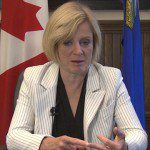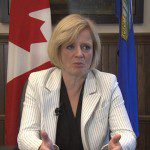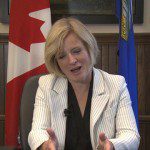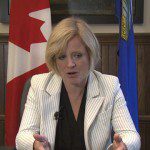Brandi Morin
APTN National News
CALGARY – First Nations need to be patient when it comes to the province of Alberta implementing the United Nations Declaration on the Rights of Indigenous Peoples and other promises made on the spring election campaign trail according to Premier Rachel Notley.
In a sit down interview with APTN, Notley said her government has been working “furiously” over the last few months since taking office to move forward on a number of goals including putting UNDRIP into place.
“It’s not something that’s happening overnight,” said Notley. “We sent a letter to ministers about UNDRIP to evaluate the work that they do and come back to us to report on what’s already aligned, what can be improved and whether there are problem areas that are potentially in conflict.”
UNDRIP is just one of the goals Notley has committed to.
While campaigning in the last provincial election, the Alberta NDP also joined the call for an inquiry into missing and murdered Indigenous women and after the election, in early June, apologized for the provinces role in the residential school era.
In regard to free, prior and informed consent when it comes to natural resources and economic development Notley admits there is a lot of confusion about how that’s defined within the contexts of UNDRIP and evolving Canadian laws. And the priorities of all Albertan’s is what’s considered first.
“Quite honestly, we have a province that is very much driven by development and the production of our natural resources,” said Notley. “So we’re not looking at approaching this in a way that would result in economic development suddenly grinding to a halt subject to free, prior and informed consent. And quite frankly the conversations that I’ve had with many First Nations leaders is they don’t see that that is the consequence of that.”
Notley said her government also plans to repeal Bill 22, the controversial Alberta Aboriginal Consultation Act introduced when the Progressive Conservatives were in power that upset many First Nations who said they were not consulted. The bill allowed the province to regulate consultation with industry over development on Aboriginal land. Many First Nations boycotted the legislation last year.
Now the province is looking at ways to improve the consultation process and to provide resources to First Nations to be able to have full knowledge of happenings at the table with industry.
“What we have now is ad hoc consultation with partners who don’t necessarily come to the table with the same level of resources. I’ve been to meetings as the premier with industry representatives, where they’ve sat down and put down three feet of documentation about their position and I’ve felt overwhelmed by it,” according to Notley. “And so, I understand the critical importance of providing adequate resources to First Nation negotiators and leaders when it comes to figuring out what’s best for their community in terms of negotiating.”
Resource revenue sharing is another issue that Alberta AFN Regional Chief Craig Mackinaw and other Indigenous leaders would like to discuss with the province.
“I don’t think we’re at a point where we would say thou shalt give x percentage of all royalties to x or y group. But I do think that there needs to be more potential work around ensuring that communities who agree with the resource development that’s occurring on their lands gain more vantage from it,” said Notley. “I think we’ve got some examples of where that does happen, where forward thinking industrial proponents have entered into agreements with indigenous communities that have their true benefit in mind- we need to move away from this idea that they just get to march in and do their thing and not understand their obligations to reach some form of common understanding that benefits all parties.”
However, she added that conversations also need to happen at the national level.
Notely called the crisis of missing and murdered Indigenous women “fundamentally important,” and said it needs to be addressed via partnership with First Nations.
Approaching the federal election this fall Notley said she will wait on the outcome before making any movements beyond supporting a national inquiry.
“Before we start committing a lot of resources to addressing that let’s wait and see who wins the election. Because I think should we end up with a different government- and I’m quite confident if it’s Thomas Mulcair that we’ll see the federal government leading that inquiry. And then the role of the province will be much clearer in terms of what to do.”
Although she said she understands the complex issues of whether Indigenous People choose to vote or not, she believes First Nations will have an impact should they do so.
“I think they should vote. And I have faith in Tom Mulcair that he has an understanding of the exceptional importance of renewing and improving the relationship between our federal government and First Nations. I would suggest that certainly, without question, Tom Mulcair as Prime Minister would bring about some pretty significant improvements in the rights of First Nations across the country.”
Alberta Minister of Aboriginal Relations Kathleen Ganley is expected to gather the mandated UNDRIP action steps from each government portfolio holder and present them to cabinet sometime next spring.















how many times have we heard the promises and that it will take time and we have to be patient,,,i think we have been patient enough. the governments of Canada need to act on all the promises made to aboriginals of Canada.
enough of this BS while we are being patient look at what is happening to our lands and waters. the rich are getting richer off our lands and waters while so many or our people live below the poverty line on reserves across Canada. time for some action…patience is long gone with all the governments
this govt will be no different that the pcs in the 70s n 80s when i lived in alberta the alberta govt will only think of what is best for the province not the first nations i seen klien use the stall statements and here we go again with the ndp and remember the ndp are union backed and union funded so which way to you honestly think they will go sure as hell not in the interest of the first nations people or the environment
Honestly, I do not have a lot of faith in the gov’t doing anything beyond dancing around the crux of matters; sovereignty and real self-government(read: not just being absorbed into white political machinery).
At the same time though, the gov’t has the guns and power at the moment, so it seems foolish to not vote and help elect someone more willing to at least face up to obligations owed to stewards of the land. If the Conservatives are trying to make it harder for the victims of Canadian society to vote(aka: IPs, landed immigrants and the poor), it means they are scared of their votes.
Sovereignty will only get harder to realize if dickheads, like Mulroney, Trudeau, Chrétien and Harper keep getting elected.
Wow. I mean WOW.